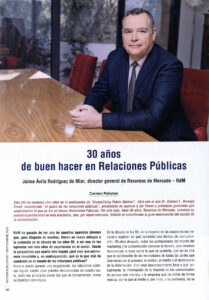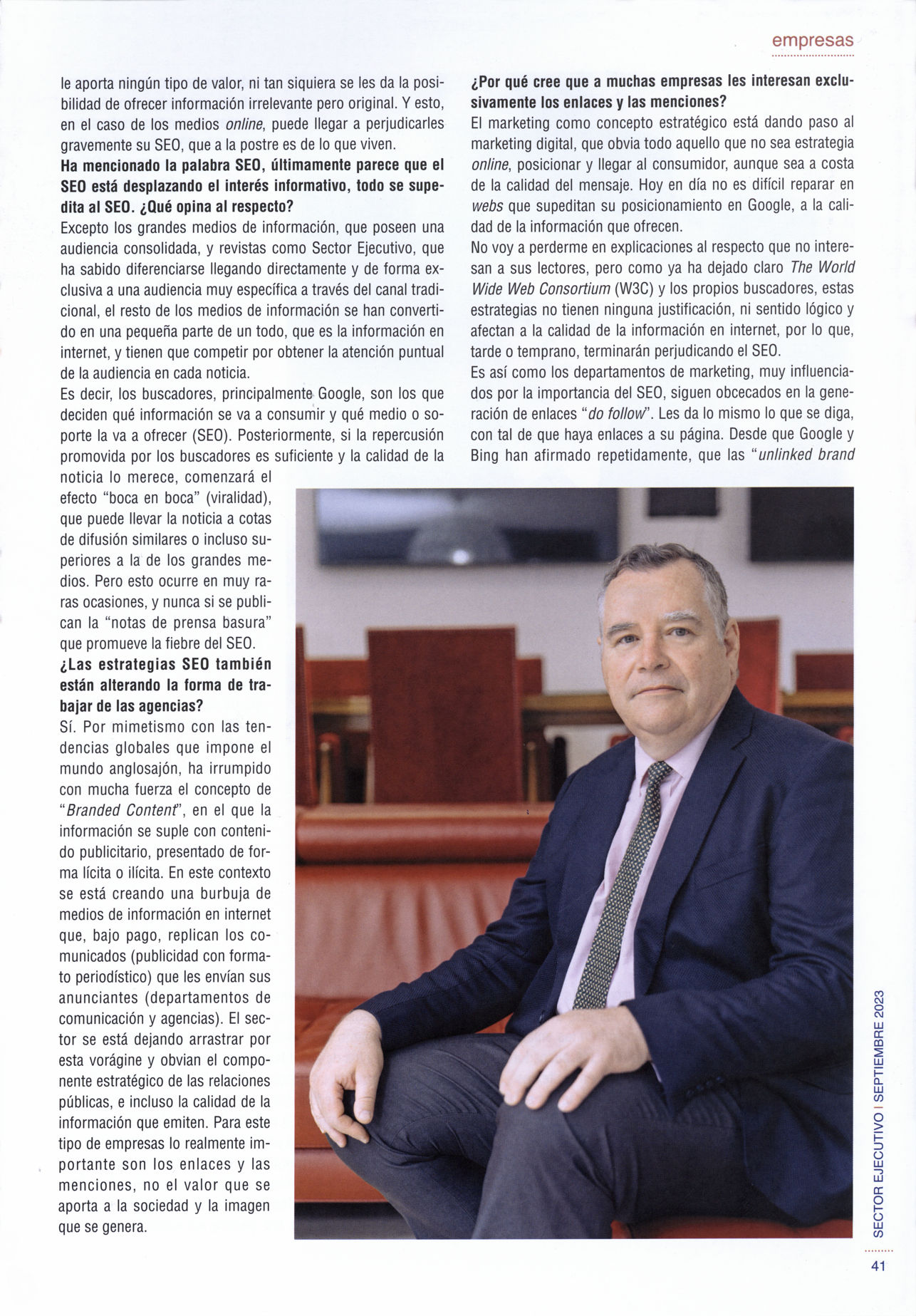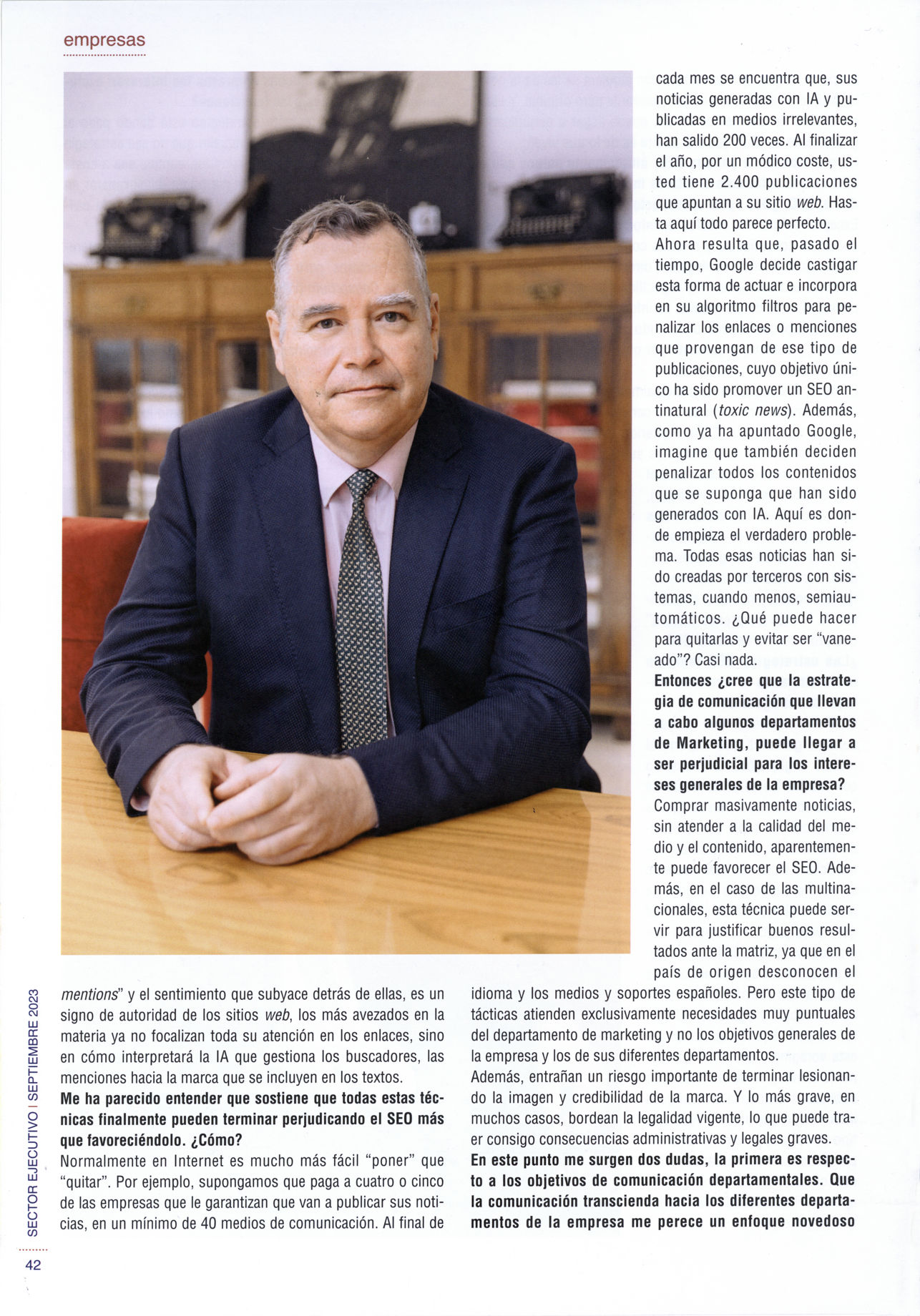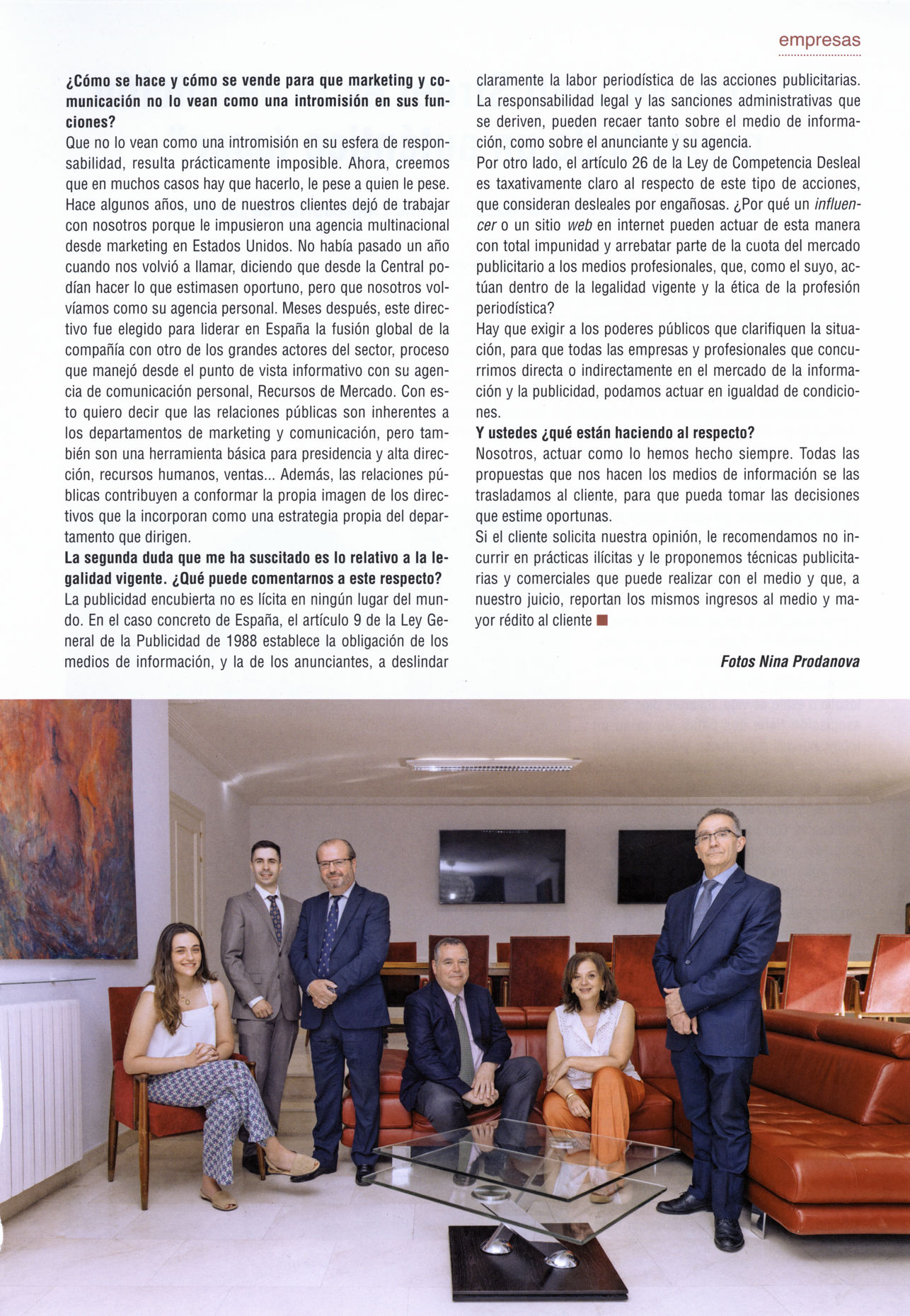This year marks the 100th anniversary of the publication of “Crystallizing Public Opinion”, a book in which Dr. Edward L. Bernays Freud, considered “the father of public relations”, presented his agency and the general lines and principles that would shape what came to be known as Public Relations. On the other hand, 30 years ago, Recursos de Mercado began its professional career in this discipline, which at that time was still considered the great unknown in the world of communication.
 RdM has gone from being one of those young agencies that, to the chagrin of many, gave a new approach to the profession in the 1990s, to being one of the agencies with the most years of experience in the sector. From the perspective provided by this background, what do you think remains unchanged and, in contrast, what has changed the most in the world of public relations?
RdM has gone from being one of those young agencies that, to the chagrin of many, gave a new approach to the profession in the 1990s, to being one of the agencies with the most years of experience in the sector. From the perspective provided by this background, what do you think remains unchanged and, in contrast, what has changed the most in the world of public relations?
Although it may seem an exaggeration, public relations are still largely unknown in our country; both the principles on which they are based and their strategic purpose.
In the 1990s, in most cases it was necessary to explain what this communication technique consisted of. Thirty years later, all marketing and communication professionals are familiar with the technique, but many are unaware of the basis on which it is based, which is none other than satisfying the needs of all the parties involved in the process: the sender, the medium and the recipient of the information. This total lack of knowledge means that, at present, the information in most press releases is only of interest to the company that issues them on a massive scale, so that the media and, therefore, its audience, are not provided with any kind of value, nor are they even given the possibility of offering irrelevant but original information. And this, in the case of online media, can seriously damage their SEO, which in the end is what they live on.
You mentioned the word SEO, lately it seems that SEO is displacing the news interest, everything is subordinated to SEO. What do you think about it?
Except for the big media, which have a consolidated audience, and magazines such as Sector Ejecutivo, which has been able to differentiate itself by reaching directly and exclusively a very specific audience through the traditional channel, the rest of the media have become a small part of a whole, which is the information on the Internet, and have to compete for the audience’s attention on each news item.
In other words, search engines, mainly Google, are the ones who decide what information will be consumed and which media or support will offer it (SEO). Subsequently, if the repercussion promoted by the search engines is sufficient and the quality of the news deserves it, the “word of mouth” effect (virality) will begin, which can take the news to levels of dissemination similar to or even higher than those of the mainstream media. But this happens very rarely, and never if the “junk press releases” promoted by SEO fever are published.
 Are SEO strategies also altering the way agencies work?
Are SEO strategies also altering the way agencies work?
Yes, by mimicking the global trends imposed by the Anglo-Saxon world, the concept of “Branded Content”, in which information is supplemented with advertising content, presented in a licit or illicit manner, has burst onto the scene with great force. In this context, a bubble of Internet media is being created which, for a fee, replicate the press releases (advertising in journalistic format) sent to them by their advertisers (communication departments and agencies). The sector is allowing itself to be dragged along by this maelstrom and ignores the strategic component of public relations, and even the quality of the information they broadcast. For this type of companies, what is really important are the links and mentions, not the value contributed to society and the image generated.
Why do you think many companies are only interested in links and mentions?
Marketing as a strategic concept is giving way to digital marketing, which ignores everything that is not an online strategy, positioning and reaching the consumer, even at the expense of the quality of the message. Nowadays it is not difficult to notice websites that make their positioning in Google dependent on the quality of the information they offer.
I am not going to get lost in explanations that are of no interest to your readers, but as The World Wide Web Consortium (W3C) and the search engines themselves have already made clear, these strategies have no justification, no logical sense and affect the quality of information on the Internet, so sooner or later they will end up hurting SEO.
This is how marketing departments, heavily influenced by the importance of SEO, are still obsessed with generating “do follow” links. They don’t care what is said, as long as there are links to their site. Since Google and Bing have repeatedly stated that “unlinked brand mentions” and the sentiment behind them is a sign of a website’s authority, the most experienced in the field no longer focus all their attention on the links, but on how the AI that manages the search engines will interpret the brand mentions included in the texts.
 I understood you to argue that all these techniques may ultimately end up hurting SEO rather than helping it. How?
I understood you to argue that all these techniques may ultimately end up hurting SEO rather than helping it. How?
Normally on the Internet it is much easier to “put up” than to “take down”. For example, suppose you pay four or five of the companies that guarantee to publish your news in at least 40 media outlets. At the end of each month, you find that your AI-generated news has been published in irrelevant media 200 times. At the end of the year, for a small fee, you have 2,400 publications pointing to your website. So far so good.
Now it turns out that, after some time, Google decides to punish this way of acting and incorporates in its algorithm filters to penalize links or mentions that come from such publications, whose sole purpose has been to promote an unnatural SEO (toxic news). In addition, as Google has already pointed out, imagine that they also decide to penalize all content that is supposed to have been generated with AI. This is where the real problem starts. All those news have been created by third parties with, at the very least, semi-automated systems. What can you do to remove them and avoid being “vanned”? Almost nothing.
So, do you think that the communication strategy carried out by some Marketing departments can be detrimental to the general interests of the company?
Buying news on a massive scale, without paying attention to the quality of the media and the content, can apparently favor SEO. Moreover, in the case of multinationals, this technique can be used to justify good results to the parent company, since in the country of origin they are unfamiliar with the language and the Spanish media and supports. But this type of tactic only serves the very specific needs of the marketing department and not the general objectives of the company and its different departments.
In addition, they entail a significant risk of damaging the image and credibility of the brand. And most seriously, in many cases, they border on the legality in force, which may entail serious administrative and legal consequences.
At this point I have two doubts, the first one is regarding departmental communication objectives. How is it done and how is it sold so that marketing and communication do not see it as an intrusion in their functions?
It is practically impossible for them not to see it as an intrusion in their sphere of responsibility. Now, we believe that in many cases it has to be done, regardless of whoever it may concern.
A few years ago, one of our clients stopped working with us because a multinational agency was imposed on him from marketing in the United States. Not a year had passed when he called us again, saying that they could do whatever they wanted from the head office, but that we would come back as his personal agency. Months later, this executive was chosen to lead in Spain the global merger of the company with another of the big players in the sector, a process that he managed from the information point of view with his personal communications agency, Recursos de Mercado. By this I mean that public relations is inherent to the marketing and communication departments, but it is also a basic tool for the presidency and senior management, human resources, sales… In addition, public relations helps to shape the image of the managers who incorporate it as a strategy of the department they manage.
 The second question I have is related to the legality in force, what can you tell us about it?
The second question I have is related to the legality in force, what can you tell us about it?
Covert advertising is not lawful anywhere in the world. In the specific case of Spain, Article 9 of the General Advertising Law of 1988 establishes the obligation of the media, and that of the advertisers, to clearly distinguish the journalistic work from the advertising actions. The legal responsibility and the administrative sanctions that may derive therefrom may fall on the media, as well as on the advertiser and its agency.
On the other hand, Article 26 of the Law of Unfair Competition is very clear about this type of actions, which are considered unfair because they are misleading. Why can an “influencer” or an Internet website act in this way with total impunity and snatch part of the advertising market share from the professional media, which, like yours, act within the current legality and ethics of the journalistic profession?
It is necessary to demand that the public authorities clarify the situation, so that all companies and professionals who compete directly or indirectly in the information and advertising market can act under equal conditions.
And what are you doing about it?
We act as we have always done. All the proposals made to us by the media are passed on to the client, so that he can make the decisions he deems appropriate.
If the client requests our opinion, we recommend not to engage in illicit practices and we suggest advertising and commercial techniques that can be used with the media and that, in our opinion, bring the same income to the media and a higher return to the client.
Interview to Jaime Ávila Rodríguez de Mier
General Director of Recursos de Mercado
Sector Ejecutivo september 2023









